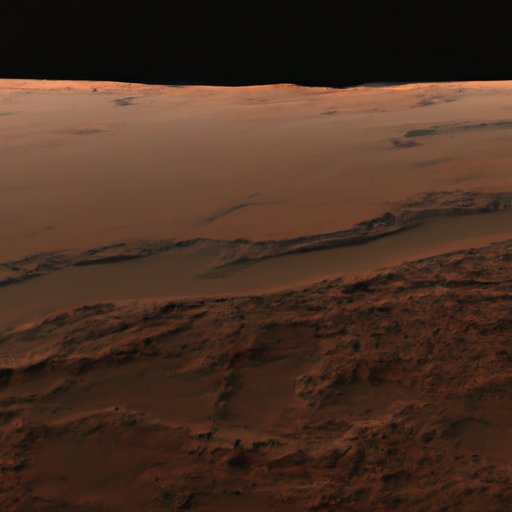
Introduction
One of the biggest questions facing space exploration and human missions to Mars is the question of breathable air. Without breathable air, human life cannot survive for long periods of time on the Red Planet. In this article, we will explore the current scientific research on whether humans can breathe on Mars and the potential challenges and solutions for breathing on the planet.
Mars: Is It Possible for Humans to Breathe on the Red Planet?
Mars has a very different composition and atmosphere compared to Earth. The atmosphere on Mars is about 100 times thinner than Earth’s, and it is made up mostly of carbon dioxide with only trace amounts of oxygen. Due to this thin atmosphere, the atmospheric pressure on Mars is much lower than Earth, which makes it difficult to breathe on the planet.
Even if humans could survive the pressure difference, the lack of oxygen in Mars’s atmosphere presents another challenge for breathing. The human body needs oxygen to survive, and without it, a person cannot breathe. While there is some oxygen on Mars, it is not enough to sustain human life.
The challenges associated with living on Mars are numerous, including potential radiation exposure, limited resources, and difficulty growing food. These challenges make it unlikely that humans could survive on Mars without significant technological advancements and advancements in terraforming.
Exploring Life on Mars: The Oxygen Conundrum
Oxygen is essential for human survival, and it is one of the main challenges facing human missions to Mars. While there may be some oxygen on Mars, it is not enough to sustain human life, and therefore scientists and researchers have been exploring the possibility of extracting oxygen from Mars.
Current research on Mars has shown that the planet has a significant amount of water in the form of ice, which researchers believe could be used to extract oxygen. However, extracting oxygen from the ice on Mars presents its own set of challenges, including the need for advanced technology to extract the oxygen and the large amount of energy required for the process.
While the challenges associated with extracting oxygen on Mars are significant, there is still hope for the future. Some researchers are exploring the possibility of using renewable energy sources such as solar power to power the extraction process and also exploring the use of new technologies such as artificial intelligence to make the process more efficient.
The Pros and Cons of Terraforming Mars: Could We Make it Habitable?
Terraforming is the process of transforming a planet to make it habitable for humans. While it is a complex and challenging process, many scientists believe it may be the most practical way to make Mars habitable for humans.
There are numerous potential benefits of terraforming Mars, including the ability to create a self-sustaining ecosystem for humans, to create a new and exciting destination for human exploration and discovery, and to help us better understand the origins of life and the universe.
However, there are also significant risks associated with terraforming Mars. These risks include potential ecological impacts, significant financial costs, and the potential impact on the indigenous Martian ecosystem. It is therefore essential to approach the question of terraforming Mars with caution and a deep understanding of the potential implications.
The Different Ways Future Astronauts Could Survive on Mars
Surviving on Mars will require significant technological advancements and methods for extracting and filtering air. Some of the survival tactics that scientists have explored include the extraction of oxygen from Martian ice, the use of protective gear such as space suits, and potential underground habitats that could shield humans from radiation exposure and other dangers.
One of the most significant challenges associated with surviving on Mars is the lack of resources. Future astronauts may have to rely on recycling and reusing their resources, including water and air. Furthermore, they may have to develop new methods for growing food or rely on alternative food sources such as algae.
Breathable Air on Mars: An Update on the Latest Scientific Discoveries
While there are numerous challenges associated with breathable air on Mars, scientists and researchers are continually making progress in understanding the planet’s atmosphere and potential solutions for breathable air. The latest scientific discoveries have shown that Mars may have more oxygen in its atmosphere than previously believed, and researchers are exploring new technologies to extract this oxygen.
Additionally, advancements in technology and artificial intelligence have the potential to revolutionize the process of extracting oxygen on Mars and make it more efficient and cost-effective.
What Mars Can Teach Us About Earth and the Origins of Life
Studying Mars and its potential for life can provide us with valuable insights into the origins of life on Earth and the potential for life on other planets. Researchers believe that studying the microbial life on Mars could help us better understand the early conditions of Earth and how life may have originated.
Additionally, studying Mars can help us better understand the potential for life on other planets and expand our knowledge of the universe. As our understanding of Mars grows, so too does our understanding of the vast and complex universe that surrounds us.
Conclusion
In conclusion, the question of breathable air on Mars is a complex and multidimensional question that requires significant scientific advancements and understanding. While the challenges associated with breathable air on Mars are significant, there is hope for the future with the advancements in technology and research. The exploration and study of Mars hold significant potential for understanding our origins and the vast universe that surrounds us, and it is essential that we continue to push the boundaries of exploration and scientific discovery.




